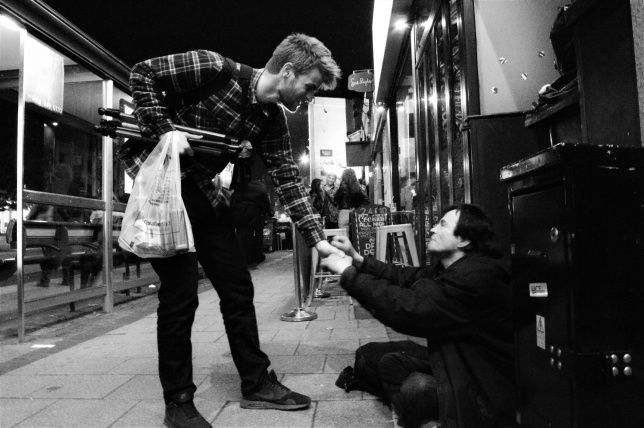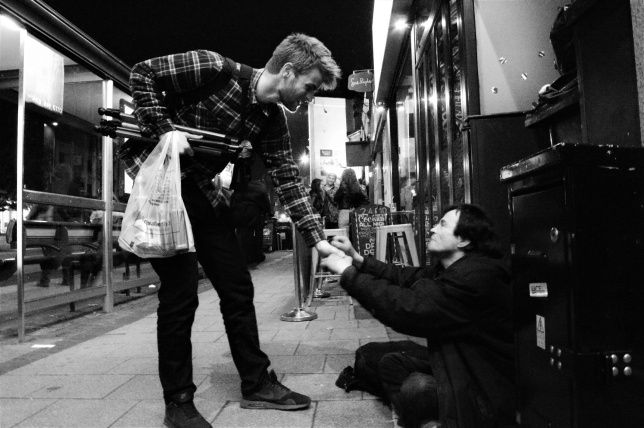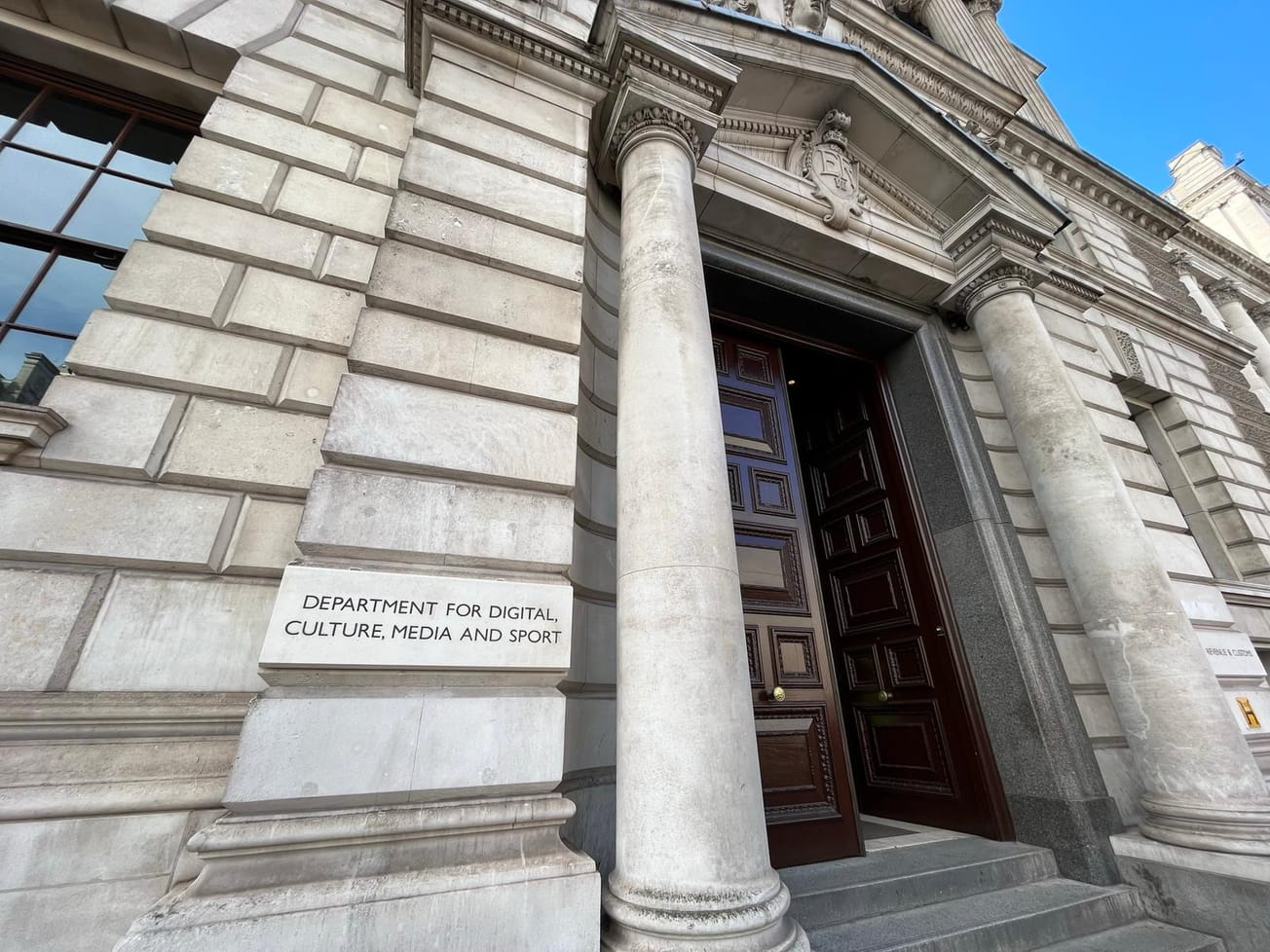By Will Harley
Epigram Features interviews Owain Astles who hopes his film will change attitudes towards the homeless.
Last year, University of Bristol student Owain Astles took to the streets of Bristol with a camera hoping to interview rough sleepers about life on the streets. He edited the resulting recordings together into a short documentary and uploaded it to Facebook. Emboldened by the positive responses the film received, Astles is now embarking on a larger, more ambitious film project aiming to change the way we think about the homeless.
'With the highest number of rough sleepers outside of London, Bristol is a city with a very visible homelessness problem'
Astles, now in his second year of a Theatre and Spanish joint honours degree, first became interested in the issues surrounding homelessness while growing up in Exeter. However, with the highest number of rough sleepers outside of London, Bristol is a city with a very visible homelessness problem.

But even as he saw homelessness rise in his home city over the last six years, Astles says he was most troubled by the attitudes towards it. ‘What really started it was seeing people who I know well and are great people, coming out with stuff like, “I don’t want to give money to a homeless person in case he keeps coming back and asking for more,” or “I’m scared of going up to someone in case they stab me.”’
While still in his first year, Astles decided he wanted to do something to change attitudes towards homeless people, and homelessness itself. ‘I had all these plans to do something and I thought it would be great to make a film about it, and I thought the best thing to do was just to go out and make one. So, on a Saturday, I went out and interviewed a few people, edited it over the evening and released it on Facebook.’
'Astles was shocked as several strangers heckled and shouted abuse – sometimes aimed at his interviewee, and sometimes at him too'
Even this small project wasn’t as straight-forward as it should have been, however. While interviewing rough sleepers, Astles encountered a backlash from passers-by. He was shocked as several strangers heckled and shouted abuse – sometimes aimed at his interviewee, and sometimes at him too. ‘A group of lads shouted out, “C***, why are you interviewing him?” and walked off. And then this guy – can’t have been any younger than mid-forties, very well-dressed – just walked past and said, “F***ing pointless, all that.”’
With the camera rolling, the hecklers only served to highlight the prominence of such worrying attitudes towards the homeless, and the positive response to Astles’ short documentary was encouraging. ‘I just put it on Facebook straight away and made sure it was no longer than five minutes, so people would actually watch it. And then those people got back to me and I thought, well, this is great, so that’s how I got the confidence to do the full project.’
Sleeping Rough - Kickstarter Video: https://t.co/bzsK8QwZRT via @YouTube
— Pastles Productions (@pastlespro) November 14, 2016
Astles began to entertain the idea of making a longer documentary with a bigger budget to shed light on the realities of homelessness and rough sleeping, and challenge common – and often harmful – misconceptions. But as he began to get the project rolling, he realised that it might be harder to reach the same audience with a longer documentary. ‘I think that if it’s five minutes or under, people love watching documentaries, whereas if it’s over, it’s difficult to keep people’s attention for that long.’
But Astles was reluctant to pursue the project as a purely fictional, scripted drama, because he didn’t want to lose the central message that stories like the ones he plans to depict are really happening every day, here in Bristol and in other British cities. That’s how Astles settled on the ‘docudrama’ format.
‘I didn’t want to make it purely fictionalised because I want to get the message across that it’s something real and actually occurring'
‘I didn’t want to make it purely fictionalised because I want to get the message across that it’s something real and actually occurring, so I chatted to people about the best way to go about it and came up with the idea of still going out and interviewing people and telling people’s real stories, but depicting those stories on screen with actors and using those recorded interviews as narration and voice-over throughout the film.’
The docudrama is set to revolve around three main characters, each devised from a collection of the most common stories Astles has heard from the people he has already interviewed. One character is a mother who is forced out of her home when she can no longer pay the rent, and struggles to regain custody of her children while trying to get off the streets.
Another is an African refugee who manages to escape deportation by finding a job which provides housing for her, but then has to leave because she is being mistreated and underpaid, and eventually ends up on the streets. The third character represents one of the most common stories Astles encountered during his interviews: a young man who has to move out of his home when he and his girlfriend break up, and ends up on the streets.
Finally, finally the Kickstarter is LIVE! Please follow the link to find out more and share it! #youcanhelp https://t.co/ErR3SOrwwS
— Sleeping Rough Film (@sleeproughfilm) November 14, 2016
A surprisingly large number of people become homeless as a result of relationship breakup. Many people end up in this situation because they would rather move out themselves than make their ex-partners and children homeless, and so local councils often classify them as ‘intentionally homeless’ which means they are ineligible for most forms of support. 218 ‘households’ were found to be ‘intentionally homeless’ in the South-West in the first quarter of 2016.
Although so-called ‘intentionally homeless’ males make up a large proportion of rough sleepers, a significant number of women are made homeless through domestic abuse. ‘Spring of Hope, where I did a lot of the interviews, is a women’s shelter and there are lots of women who’ve come to there through domestic abuse,” says Astles, ‘They’ve literally had to leave their house and don’t have anywhere else to go so they either have to go to this shelter or sleep rough.’
Homelessness has risen sharply in Bristol in recent years. The figures hit a low in 2011, with only 141 households in ‘temporary accommodation’. Five years later, that figure has almost quadrupled at 474 households in the city of Bristol alone. However, as Iman Qureshi of the homelessness charity Shelter (which displays the government homelessness statistics on its website) noted, ‘These statistics, although the official measure of homelessness, don’t include people who are homeless but not in priority need, or “intentionally homeless”. So, in actual fact, the numbers are much bigger.’
'Astles is hopeful his film will change attitudes towards the growing numbers of homeless people in Bristol and across the UK'
While acknowledging the colossal scale of the crisis, Astles is hopeful his film will change attitudes towards the growing numbers of homeless people in Bristol and across the UK. ‘There are loads of things that need to be done, but the principal thing that I want to do is to change people’s perceptions: making people realise that it’s not usually their fault, there are way that you can change it and just making people more sympathetic towards homeless people.’
120,000 children in britain will be homeless this Christmas.
— Shelter (@Shelter) November 14, 2016
They deserve better. Help Shelter to be there for them https://t.co/qIGJR853Ou pic.twitter.com/mHShGbVDWn
For Pastles Productions, Astles’ own production company, the docudrama will be a very large-budget project. The company has therefore started a crowd-funding campaign for the film, which you can find here.
Provided the money can be raised, production on the film will start in January, and Astles hopes the film will be ready for release in the summer of 2017. With this ambitious project, Astles aims to replicate the success of his initial ‘ultra-short’ documentary on a wider, grander scale.
If you need housing advice or would like to volunteer with Shelter, get in touch with Shelter Bristol on 0344 515 1430.
Are homeless people treated unfairly? Let us know what you think...









